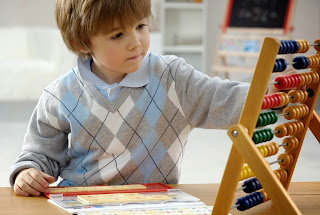Babies are born really brainy. They have
more than enough brain cells and neurons to meet life’s challenges. But they
continue to grow brain connections in their first few years – in fact over 700
more every second. Babies’ developing brains are always incredibly busy. Sights,
sounds, and other experiences are flooding into babies’ brains, being processed
and filed, in just the right places. Quite amazing, really! The foundations are
being built for learning language, emotions, socializing and much more.
In other words, baby’s brains are doing their job – nonstop
– detecting and sorting sounds, long before they start talking. Some of this
capability to pick up sounds results from genes. But it’s the changes in sounds
detected by babies’ brains that really matter most. The more that babies’
brains are trained to pay attention to changes in sounds detected, even tiny
differences in inflections or frequencies, the better they will be able to read
or speak their own or foreign languages later on. A vast amount of neuroscience research confirms that babies’ brains need training, from the earliest age, to master foreign sounds. Language training needs to begin at birth. From birth, babies need to hear languages other than their own native language. Otherwise later on they will be less capable of distinguishing different sounds not used in their native language. Babies exposed to multiple languages during their first few months are much better able to recognize and retain sounds from all the languages they hear.
When a baby is born, it has the capacity to
distinguish every type of speech sound. It doesn’t matter what language –
Greek, Chinese, English, etc. However, just six months later, an infant can
only recognize vowels from its native language. Within another two or three
months the same happens to consonant sounds. So by the age of nine to 10
months, a baby's universal language ability is reduced to its native language.
Shocking, perhaps, but true nonetheless.
This fact helps to explain why Italian and Spanish speakers find it easier to
learn French than English speakers – similar sounds in their native tongues.
Researchers have found that babies spoken to in Chinese for just one hour a
week are much better able to recognize Chinese speech when they are older.
I came across a company that resembles a
Lumosity for Kids. Kadho has translated an abundance of such research into
games that assist parents to expose their babies to the sounds of different
languages in their early lives. In addition to babbling their own sounds to
babies, Kadho’s apps assist parents to immerse their infants in the beneficial
sounds of four languages, and also have fun popping balloons. Parents are
entertained, too.
Their first app Mochu Pop is available now for download on the Itunes App store for Ipad, in Google Play for Android and in the Amazon App store fore Kindle. It is designed for 1-3 year olds and features a likable character by the name of Mochu the Penguin. The object of the game is for the child to pop matching balloons and be rewarded with one of 4,000 sounds from 12 different languages. Kadho will follow Mochu Pop with several other apps and eBooks, soon you and your child will be able to enjoy two ebooks by Kadho Inc called Mochu Says Goodnight and A Royal Birthday, as well as a new game Mochu Builds Tree Houses.
Their first app Mochu Pop is available now for download on the Itunes App store for Ipad, in Google Play for Android and in the Amazon App store fore Kindle. It is designed for 1-3 year olds and features a likable character by the name of Mochu the Penguin. The object of the game is for the child to pop matching balloons and be rewarded with one of 4,000 sounds from 12 different languages. Kadho will follow Mochu Pop with several other apps and eBooks, soon you and your child will be able to enjoy two ebooks by Kadho Inc called Mochu Says Goodnight and A Royal Birthday, as well as a new game Mochu Builds Tree Houses.
About the Author: Arnold Schuchter
A city planner and international
development planning consultant and author, Arnold Schuchter also has founded
companies in online business information services, online consumer travel
services, concert and special events promotion, political campaign management,
and digital publishing.
About Kadho
Founded by Dr. Kaveh Azartash and Dr.
Dhonam Pemba both PhDs in Biomedical Engineering with emphasis in vision and
neuroscience, and being backed by a strong network of early childhood
educators, neuroscientists, linguists and child psychologists, Kadho Inc. is
utilizing the last 50 years of brain science to develop games and eBooks to
maintain and enhance the innate abilities that children are born with. Kadho’s
apps and eBooks teach the building blocks of linguistics by exposing babies and
toddlers 4,000 key sounds from 12 languages recorded by native speakers in a
customized manner that adapts to child’s learning pace. When children this
young hear these sounds repetitively it unlocks a part of their brain to ready
it for learning their native and other languages. Kadho is proudly incubated at
EvoNexus. For more information, visit
their informative website, www.kadho.com.







